

SUBSCRIBE TO OUR FREE NEWSLETTER
Daily news & progressive opinion—funded by the people, not the corporations—delivered straight to your inbox.
5
#000000
#FFFFFF
To donate by check, phone, or other method, see our More Ways to Give page.


Daily news & progressive opinion—funded by the people, not the corporations—delivered straight to your inbox.

Oakland Education Association President, Keith Brown, leads a march today of striking teachers through downtown Oakland. "We ask the School Board Superintendent: Which side are you on?" said Brown, as he rallied a crowd of thousands of striking teachers, parents, and students. (Photo: Inthesetimes)
Thousands of teachers in Oakland, California, went on strike this morning--the latest in a series of increasingly militant work stoppages by educators across the country.
In January, teachers in Los Angeles, California, won a historic strike, securing smaller class sizes, a nurse in every school, a reduction in standardized testing, a 6 percent pay raise for teachers and a plan for the School Board to vote to call on the state to cap charter school growth.
The teachers union in Denver, Colorado, won its first strike in 25 years last week, while educators in West Virginia walked out earlier this week, halting proposed legislation that would have allowed tax dollars to pay for private-school tuition.
Today, the 3,000-member Oakland Education Association (OEA) is on strike after 95 percent of its members voted on February 4 to authorize the work stoppage. The union says it has picket lines up at all 86 educational campuses in Oakland.
The Oakland teachers strike is as much about defending public education as it is about teacher pay.
The Oakland teachers strike is as much about defending public education as it is about teacher pay.
United under the slogan, "Fighting for the schools our students deserve," the union is calling for smaller class sizes, more support services for students (nurses, counselors and librarians), and an end to neighborhood school closures.
Currently, 24 Oakland public schools are slated for closure, the majority of them in poor and working-class communities of color.
The school closures are directly related to the rise in charter schools. According to a report by In the Public Interest, charter schools in Oakland are currently costing the district $57 million dollars per year.
The union is also calling for a living wage for teachers who are increasingly being priced out of Oakland. According to a recent op ed by the union's president, Keith Brown, a starting teacher would have to spend 60 percent of their salary to afford a one-bedroom apartment in Oakland. Unsurprisingly, the district is losing 500 teachers per year, leaving a 24 percent vacancy rate in teaching positions in the district.
The strike has received strong support from families and students in the school district.
Parents, congregations and community organizations have been organizing "Strike Schools" that provide a safe space for children to go during the day--without crossing a picket line. This expands the options for parents who cannot afford to stay home from work to watch their children.
One congregation in Oakland, Taylor Memorial United Methodist Church, had pledged to take in up to 250 students per day, feeding them free lunch and snacks. Pastor Anthony Jenkins called on other places of worship to do likewise.
Meanwhile, "Bread for Ed" campaign, co-sponsored by the OEA, has already raised $46,000 in funds to feed low-income students during the strike who normally receive subsidized meals at school.
Student support for the strike is also high, as students have organized various walk-outs and marches in Oakland this month to support the teachers' demands.
Here are some of the faces and voices of teachers, parents, and students from today's picket lines.
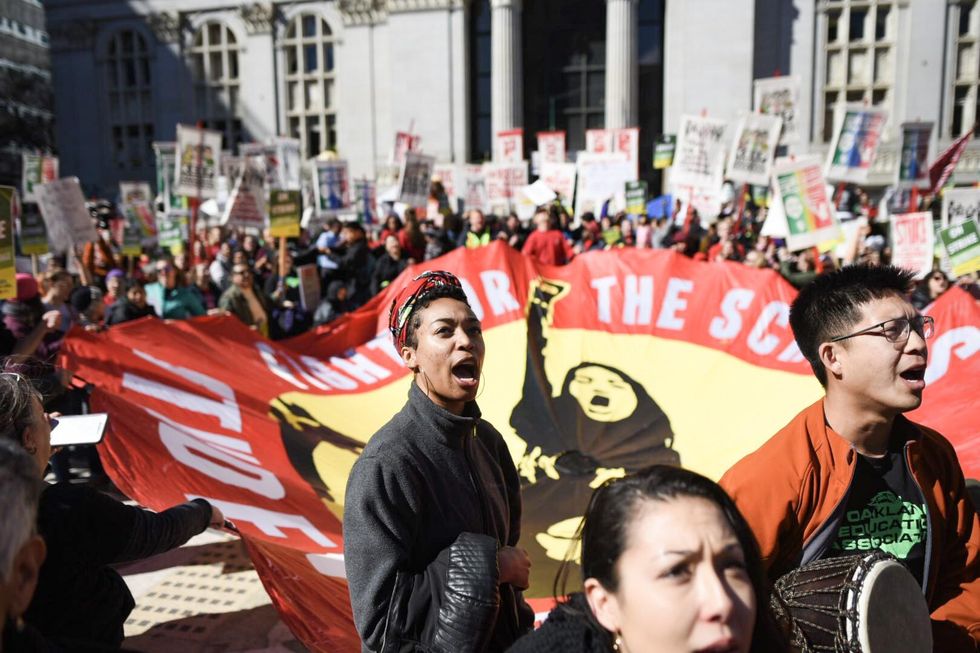
Thousands of striking teachers, parents and students rally at Oscar Grant Plaza in downtown Oakland, calling on Oakland Unified School District to lower class sizes, increase student support services, and pay teachers a living wage.
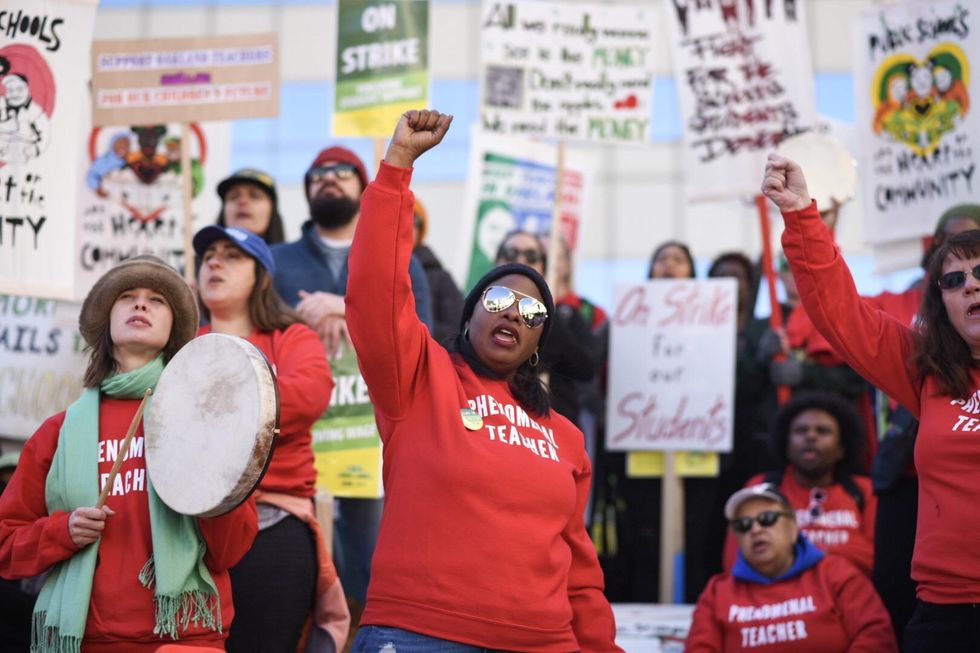
Striking teachers rally in downtown Oakland.
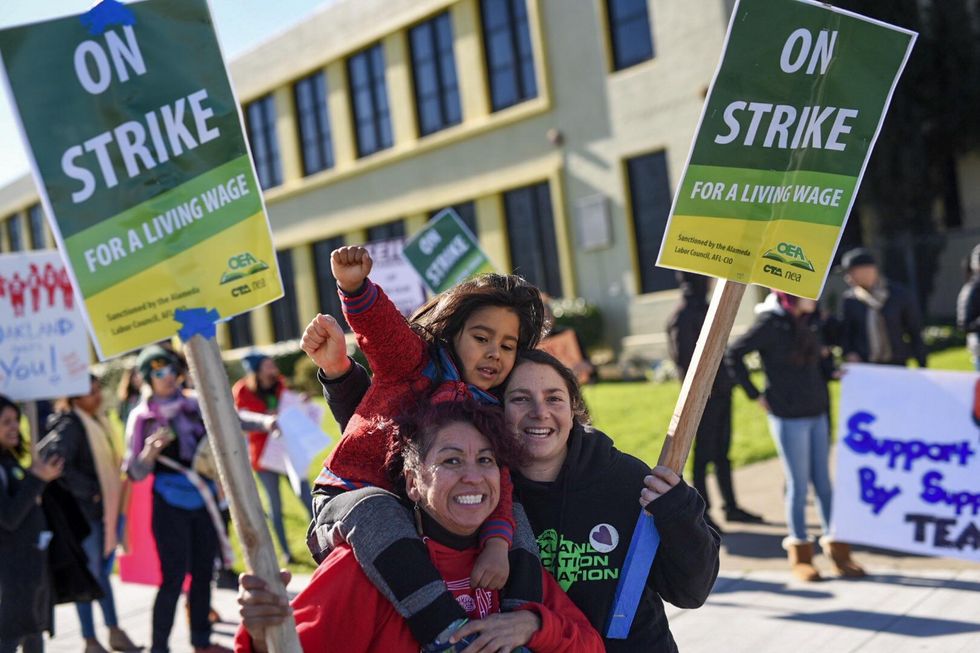
Becca Rozo, an 11th and 12th grade humanities teacher at Coliseum College Prep Academy in Oakland pickets outside her school with her co-parent, Claudia, and son, Emiliano. Rozo was looking through a text thread of teachers from around the district and said, "Most students are respecting the picket lines and are not attending school today."
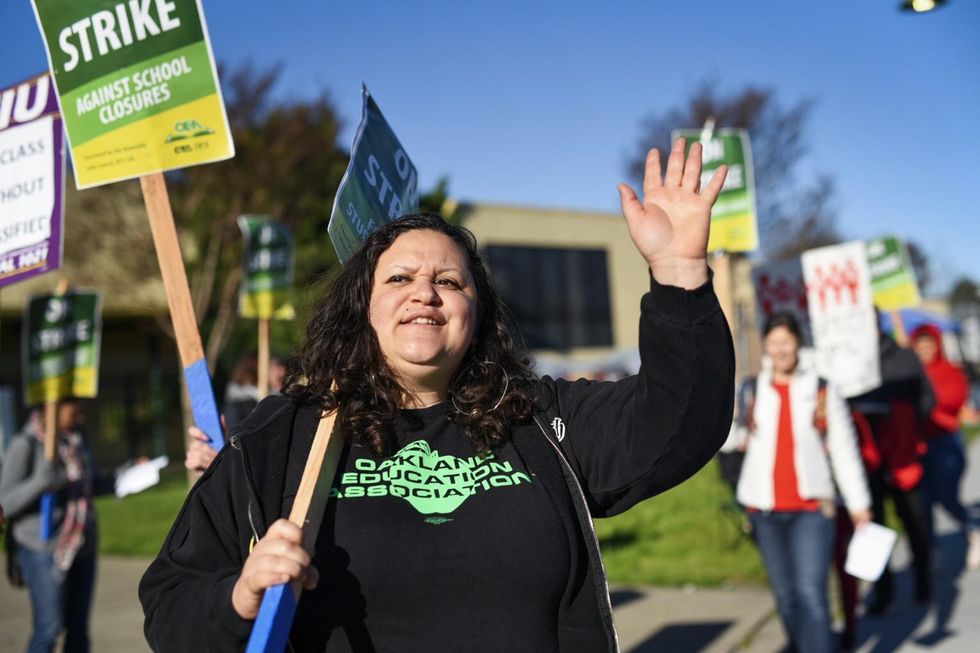
Chela Delgado, an 11th and 12th grade humanities teacher at Coliseum College Prep Academy who has been teaching for 15 years, waves to motorists who honk in support of the teachers picket line. "I'm out here today because I love teaching," said Delgado. "But teachers of color are being forced out of the district. They can go to literally any other school in the district and get paid thousands more than they can make in Oakland. We're losing teachers. It's connected to the housing crisis."
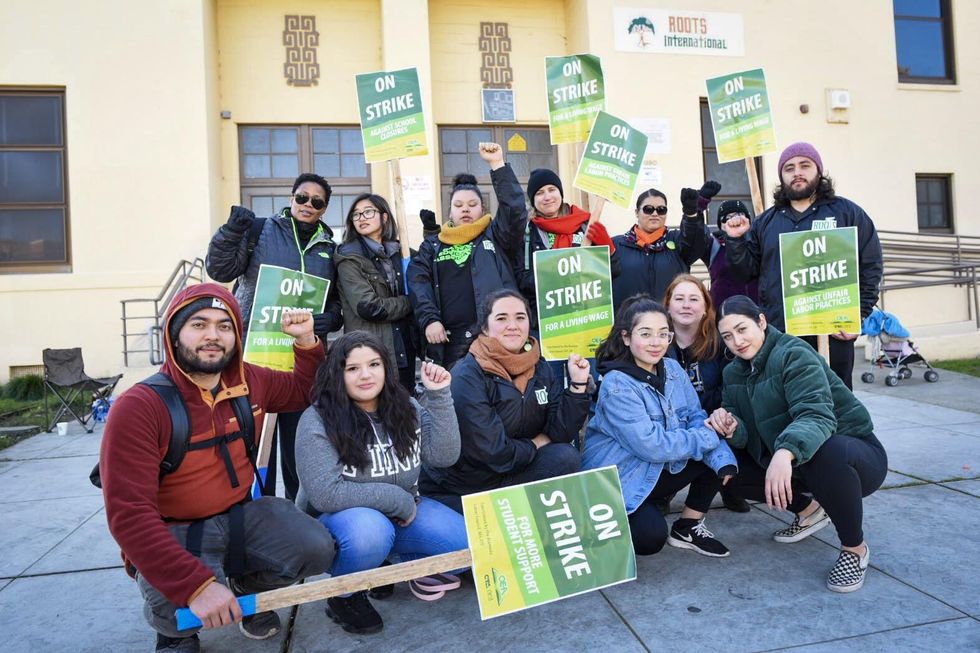
Silvia Ornelas (back, orange scarf) poses with striking teachers and parents at Roots International Academy in Oakland. Ornelas is a parent activist with a child at Roots who has been fighting to keep the school open after the school district announced last fall plans to close or consolidate 24 schools in Oakland, including Roots. "The schools they are closing are in the flatlands, where black and brown students go. They're not closing the schools in the hills. I have a daughter with Down Syndrome, so I know the speech therapists and teachers' aides well. They are all stressed out. I support them 100 percent. They need more resources," said Ornelas.
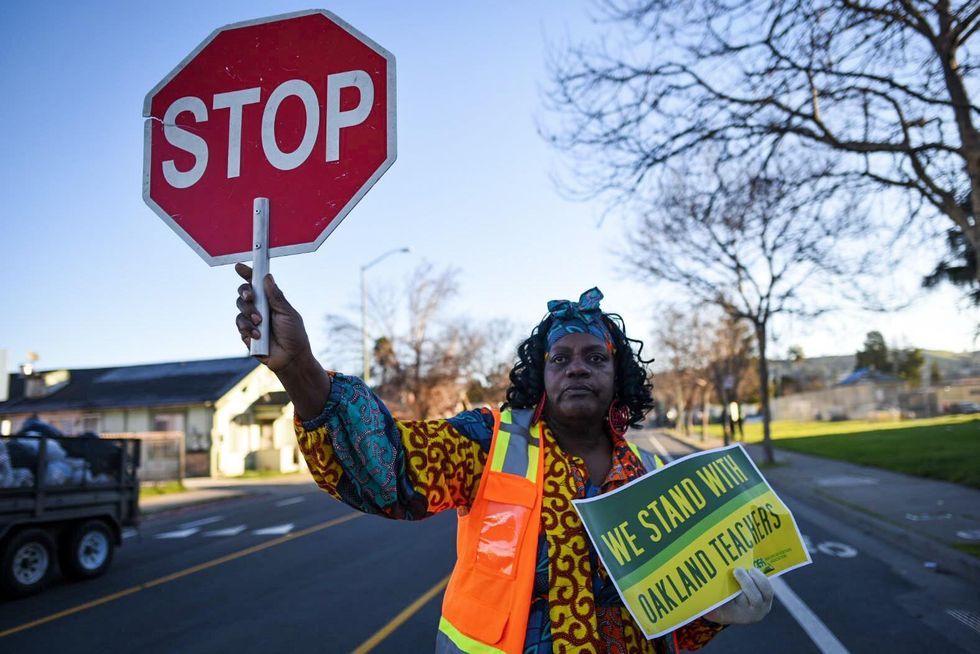
Sanda Wilson, a volunteer crossing guard at Elmhurst Community Prep, a middle school in deep East Oakland, shows her support for striking teachers while directing traffic. "I have 9 kids in the Oakland schools," said Wilson. "These teachers raised my kids and they deserve a raise. The classes are too large and we need more nurses in the schools."
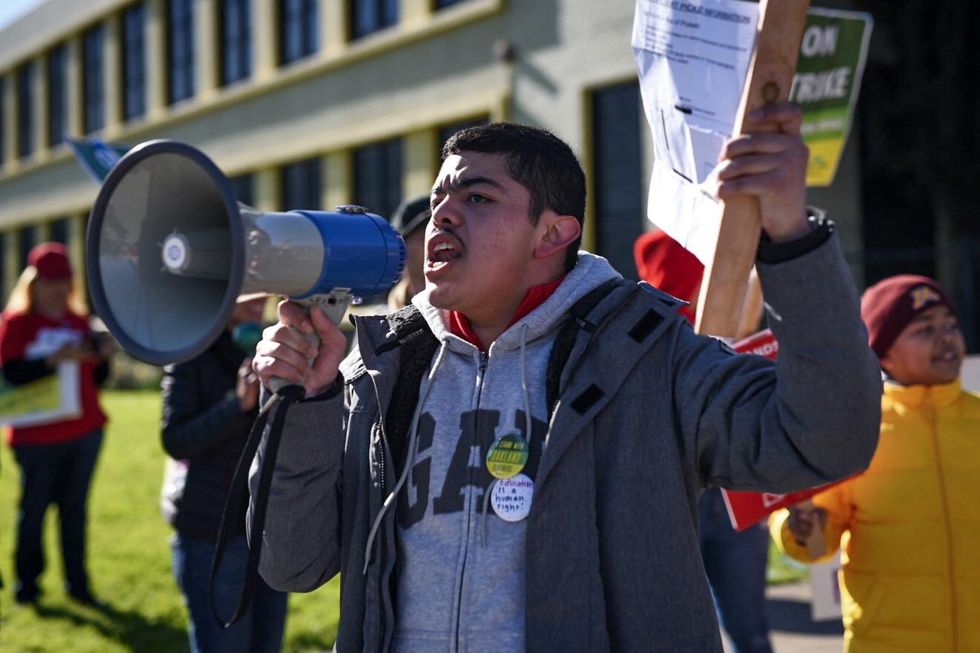
Alexis Ayala, a 15-year-old student in 10th grade at Coliseum College Prep Academy, leads chants on the teachers' picket line. Last week, Ayala, with his friends Carla Franco and Erika Nuno, organized a "walk-in" where students rallied in support of their teachers and educated students about the strike. "I believe there should be more teachers so that teachers can give more support to students and not have to have our hands raised for so long," said Ayala.
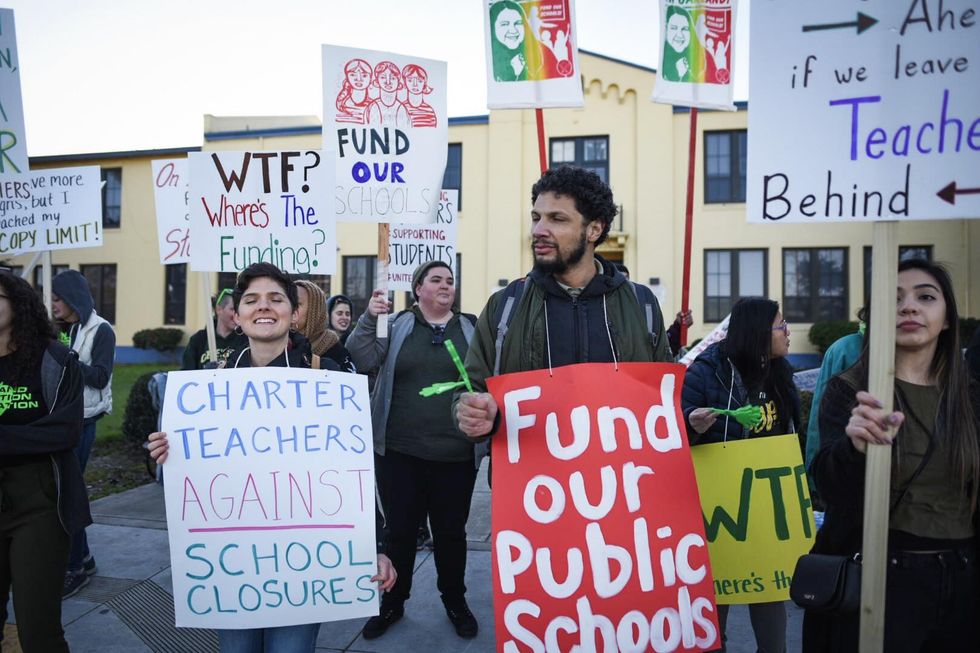
Catie Tombes (back) rallies with other charter school teachers in support of the public school teachers strike in Oakland. Tombes is a second-year, ninth-grade English teacher at ARISE High School in Oakland, a charter school. "We're using our voice to call out privatization too," said Tombes. "Charter school teachers know that expansion [of charter schools] is not a good thing. The other unifying thing between OUSD teachers and charter school teachers is wanting dignity and respect for the profession. Teaching is feminized and undervalued."
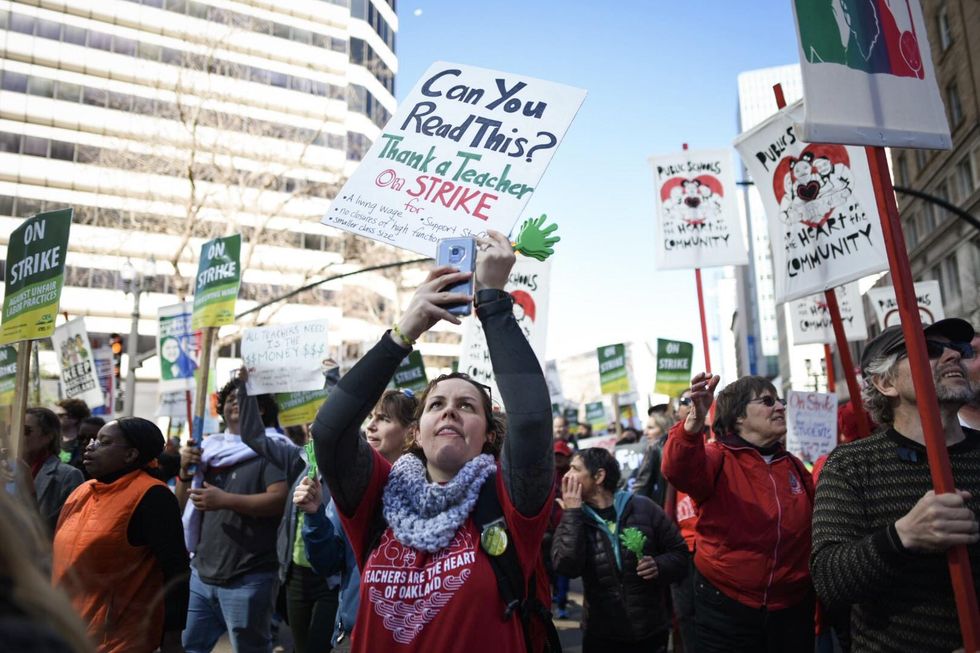
A teacher holds up a sign reading "Can you read this? Thank a Teacher on STRIKE" as she marches through downtown Oakland.
Trump and Musk are on an unconstitutional rampage, aiming for virtually every corner of the federal government. These two right-wing billionaires are targeting nurses, scientists, teachers, daycare providers, judges, veterans, air traffic controllers, and nuclear safety inspectors. No one is safe. The food stamps program, Social Security, Medicare, and Medicaid are next. It’s an unprecedented disaster and a five-alarm fire, but there will be a reckoning. The people did not vote for this. The American people do not want this dystopian hellscape that hides behind claims of “efficiency.” Still, in reality, it is all a giveaway to corporate interests and the libertarian dreams of far-right oligarchs like Musk. Common Dreams is playing a vital role by reporting day and night on this orgy of corruption and greed, as well as what everyday people can do to organize and fight back. As a people-powered nonprofit news outlet, we cover issues the corporate media never will, but we can only continue with our readers’ support. |
Thousands of teachers in Oakland, California, went on strike this morning--the latest in a series of increasingly militant work stoppages by educators across the country.
In January, teachers in Los Angeles, California, won a historic strike, securing smaller class sizes, a nurse in every school, a reduction in standardized testing, a 6 percent pay raise for teachers and a plan for the School Board to vote to call on the state to cap charter school growth.
The teachers union in Denver, Colorado, won its first strike in 25 years last week, while educators in West Virginia walked out earlier this week, halting proposed legislation that would have allowed tax dollars to pay for private-school tuition.
Today, the 3,000-member Oakland Education Association (OEA) is on strike after 95 percent of its members voted on February 4 to authorize the work stoppage. The union says it has picket lines up at all 86 educational campuses in Oakland.
The Oakland teachers strike is as much about defending public education as it is about teacher pay.
The Oakland teachers strike is as much about defending public education as it is about teacher pay.
United under the slogan, "Fighting for the schools our students deserve," the union is calling for smaller class sizes, more support services for students (nurses, counselors and librarians), and an end to neighborhood school closures.
Currently, 24 Oakland public schools are slated for closure, the majority of them in poor and working-class communities of color.
The school closures are directly related to the rise in charter schools. According to a report by In the Public Interest, charter schools in Oakland are currently costing the district $57 million dollars per year.
The union is also calling for a living wage for teachers who are increasingly being priced out of Oakland. According to a recent op ed by the union's president, Keith Brown, a starting teacher would have to spend 60 percent of their salary to afford a one-bedroom apartment in Oakland. Unsurprisingly, the district is losing 500 teachers per year, leaving a 24 percent vacancy rate in teaching positions in the district.
The strike has received strong support from families and students in the school district.
Parents, congregations and community organizations have been organizing "Strike Schools" that provide a safe space for children to go during the day--without crossing a picket line. This expands the options for parents who cannot afford to stay home from work to watch their children.
One congregation in Oakland, Taylor Memorial United Methodist Church, had pledged to take in up to 250 students per day, feeding them free lunch and snacks. Pastor Anthony Jenkins called on other places of worship to do likewise.
Meanwhile, "Bread for Ed" campaign, co-sponsored by the OEA, has already raised $46,000 in funds to feed low-income students during the strike who normally receive subsidized meals at school.
Student support for the strike is also high, as students have organized various walk-outs and marches in Oakland this month to support the teachers' demands.
Here are some of the faces and voices of teachers, parents, and students from today's picket lines.

Thousands of striking teachers, parents and students rally at Oscar Grant Plaza in downtown Oakland, calling on Oakland Unified School District to lower class sizes, increase student support services, and pay teachers a living wage.

Striking teachers rally in downtown Oakland.

Becca Rozo, an 11th and 12th grade humanities teacher at Coliseum College Prep Academy in Oakland pickets outside her school with her co-parent, Claudia, and son, Emiliano. Rozo was looking through a text thread of teachers from around the district and said, "Most students are respecting the picket lines and are not attending school today."

Chela Delgado, an 11th and 12th grade humanities teacher at Coliseum College Prep Academy who has been teaching for 15 years, waves to motorists who honk in support of the teachers picket line. "I'm out here today because I love teaching," said Delgado. "But teachers of color are being forced out of the district. They can go to literally any other school in the district and get paid thousands more than they can make in Oakland. We're losing teachers. It's connected to the housing crisis."

Silvia Ornelas (back, orange scarf) poses with striking teachers and parents at Roots International Academy in Oakland. Ornelas is a parent activist with a child at Roots who has been fighting to keep the school open after the school district announced last fall plans to close or consolidate 24 schools in Oakland, including Roots. "The schools they are closing are in the flatlands, where black and brown students go. They're not closing the schools in the hills. I have a daughter with Down Syndrome, so I know the speech therapists and teachers' aides well. They are all stressed out. I support them 100 percent. They need more resources," said Ornelas.

Sanda Wilson, a volunteer crossing guard at Elmhurst Community Prep, a middle school in deep East Oakland, shows her support for striking teachers while directing traffic. "I have 9 kids in the Oakland schools," said Wilson. "These teachers raised my kids and they deserve a raise. The classes are too large and we need more nurses in the schools."

Alexis Ayala, a 15-year-old student in 10th grade at Coliseum College Prep Academy, leads chants on the teachers' picket line. Last week, Ayala, with his friends Carla Franco and Erika Nuno, organized a "walk-in" where students rallied in support of their teachers and educated students about the strike. "I believe there should be more teachers so that teachers can give more support to students and not have to have our hands raised for so long," said Ayala.

Catie Tombes (back) rallies with other charter school teachers in support of the public school teachers strike in Oakland. Tombes is a second-year, ninth-grade English teacher at ARISE High School in Oakland, a charter school. "We're using our voice to call out privatization too," said Tombes. "Charter school teachers know that expansion [of charter schools] is not a good thing. The other unifying thing between OUSD teachers and charter school teachers is wanting dignity and respect for the profession. Teaching is feminized and undervalued."

A teacher holds up a sign reading "Can you read this? Thank a Teacher on STRIKE" as she marches through downtown Oakland.
Thousands of teachers in Oakland, California, went on strike this morning--the latest in a series of increasingly militant work stoppages by educators across the country.
In January, teachers in Los Angeles, California, won a historic strike, securing smaller class sizes, a nurse in every school, a reduction in standardized testing, a 6 percent pay raise for teachers and a plan for the School Board to vote to call on the state to cap charter school growth.
The teachers union in Denver, Colorado, won its first strike in 25 years last week, while educators in West Virginia walked out earlier this week, halting proposed legislation that would have allowed tax dollars to pay for private-school tuition.
Today, the 3,000-member Oakland Education Association (OEA) is on strike after 95 percent of its members voted on February 4 to authorize the work stoppage. The union says it has picket lines up at all 86 educational campuses in Oakland.
The Oakland teachers strike is as much about defending public education as it is about teacher pay.
The Oakland teachers strike is as much about defending public education as it is about teacher pay.
United under the slogan, "Fighting for the schools our students deserve," the union is calling for smaller class sizes, more support services for students (nurses, counselors and librarians), and an end to neighborhood school closures.
Currently, 24 Oakland public schools are slated for closure, the majority of them in poor and working-class communities of color.
The school closures are directly related to the rise in charter schools. According to a report by In the Public Interest, charter schools in Oakland are currently costing the district $57 million dollars per year.
The union is also calling for a living wage for teachers who are increasingly being priced out of Oakland. According to a recent op ed by the union's president, Keith Brown, a starting teacher would have to spend 60 percent of their salary to afford a one-bedroom apartment in Oakland. Unsurprisingly, the district is losing 500 teachers per year, leaving a 24 percent vacancy rate in teaching positions in the district.
The strike has received strong support from families and students in the school district.
Parents, congregations and community organizations have been organizing "Strike Schools" that provide a safe space for children to go during the day--without crossing a picket line. This expands the options for parents who cannot afford to stay home from work to watch their children.
One congregation in Oakland, Taylor Memorial United Methodist Church, had pledged to take in up to 250 students per day, feeding them free lunch and snacks. Pastor Anthony Jenkins called on other places of worship to do likewise.
Meanwhile, "Bread for Ed" campaign, co-sponsored by the OEA, has already raised $46,000 in funds to feed low-income students during the strike who normally receive subsidized meals at school.
Student support for the strike is also high, as students have organized various walk-outs and marches in Oakland this month to support the teachers' demands.
Here are some of the faces and voices of teachers, parents, and students from today's picket lines.

Thousands of striking teachers, parents and students rally at Oscar Grant Plaza in downtown Oakland, calling on Oakland Unified School District to lower class sizes, increase student support services, and pay teachers a living wage.

Striking teachers rally in downtown Oakland.

Becca Rozo, an 11th and 12th grade humanities teacher at Coliseum College Prep Academy in Oakland pickets outside her school with her co-parent, Claudia, and son, Emiliano. Rozo was looking through a text thread of teachers from around the district and said, "Most students are respecting the picket lines and are not attending school today."

Chela Delgado, an 11th and 12th grade humanities teacher at Coliseum College Prep Academy who has been teaching for 15 years, waves to motorists who honk in support of the teachers picket line. "I'm out here today because I love teaching," said Delgado. "But teachers of color are being forced out of the district. They can go to literally any other school in the district and get paid thousands more than they can make in Oakland. We're losing teachers. It's connected to the housing crisis."

Silvia Ornelas (back, orange scarf) poses with striking teachers and parents at Roots International Academy in Oakland. Ornelas is a parent activist with a child at Roots who has been fighting to keep the school open after the school district announced last fall plans to close or consolidate 24 schools in Oakland, including Roots. "The schools they are closing are in the flatlands, where black and brown students go. They're not closing the schools in the hills. I have a daughter with Down Syndrome, so I know the speech therapists and teachers' aides well. They are all stressed out. I support them 100 percent. They need more resources," said Ornelas.

Sanda Wilson, a volunteer crossing guard at Elmhurst Community Prep, a middle school in deep East Oakland, shows her support for striking teachers while directing traffic. "I have 9 kids in the Oakland schools," said Wilson. "These teachers raised my kids and they deserve a raise. The classes are too large and we need more nurses in the schools."

Alexis Ayala, a 15-year-old student in 10th grade at Coliseum College Prep Academy, leads chants on the teachers' picket line. Last week, Ayala, with his friends Carla Franco and Erika Nuno, organized a "walk-in" where students rallied in support of their teachers and educated students about the strike. "I believe there should be more teachers so that teachers can give more support to students and not have to have our hands raised for so long," said Ayala.

Catie Tombes (back) rallies with other charter school teachers in support of the public school teachers strike in Oakland. Tombes is a second-year, ninth-grade English teacher at ARISE High School in Oakland, a charter school. "We're using our voice to call out privatization too," said Tombes. "Charter school teachers know that expansion [of charter schools] is not a good thing. The other unifying thing between OUSD teachers and charter school teachers is wanting dignity and respect for the profession. Teaching is feminized and undervalued."

A teacher holds up a sign reading "Can you read this? Thank a Teacher on STRIKE" as she marches through downtown Oakland.